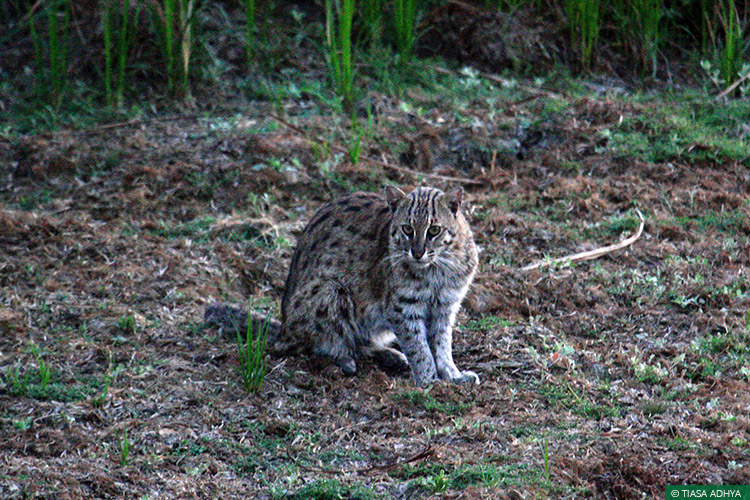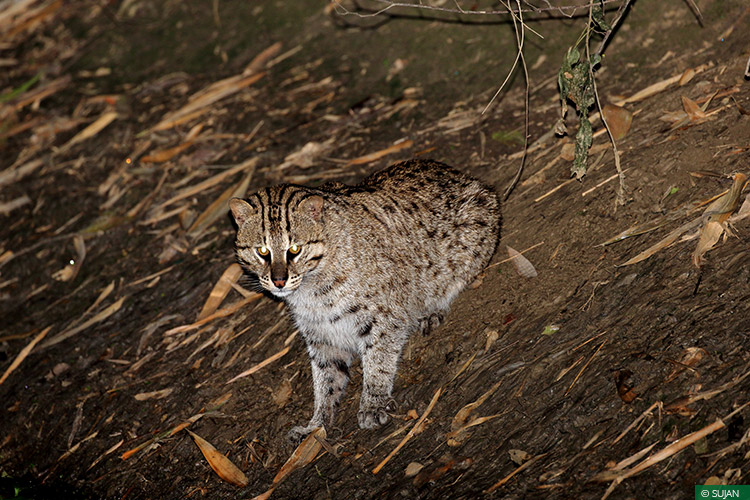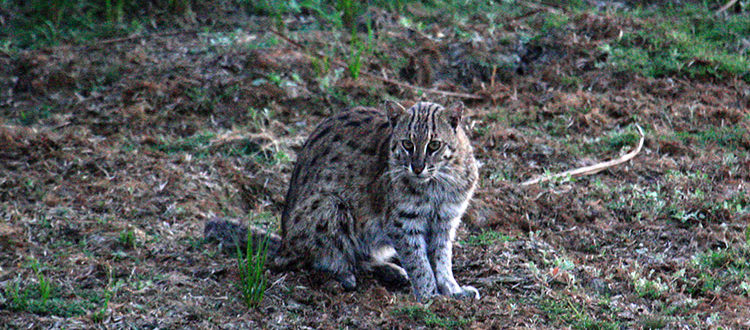A Cat out of Water: Engaging with Local Communities to Protect Fishing Cat Populations in West Bengal

A project by Wildlife Trust of India, supported by David Shepherd Wildlife Foundation, seeks to engage with village communities in the state of West Bengal to protect the declining local population of fishing cats, writes Debobroto Sircar.
The fishing cat (Prionailurus viverrinus) is one among several smaller wild cat species prowling the Indian subcontinent. It is a nocturnal, medium-sized cat usually found near swamps, marshlands, oxbow lakes, tidal creeks and mangroves. Extensive habitat loss and a rise in retaliatory killings due to increased conflict with humans have caused an estimated 30 percent decline in the global population of these felids within the last 15 years.
In India, fishing cats are recorded discontinuously from the Himalayan foothills of the Terai region (North India), Bharatpur in the western state of Rajasthan, and Andhra Pradesh and West Bengal in the east. Listed as a ‘Vulnerable’ in the IUCN Red List, they are accorded the highest protection under Schedule I of the Wild Life (Protection) Act, 1972, but the rampant destruction of their wetland habitats – which are being converted into agricultural land or otherwise fragmented and destroyed to meet the resource needs of the country‘s burgeoning human population – is a major cause of concern. Fishing cats are also targeted by hunters and poachers for their skin and meat.
Studies have indicated a 44 percent decline in the fishing cat’s habitat in West Bengal, and a concomitant increase in conflict with humans.
The fishing cat is the state animal of West Bengal and there are strongholds of the species in the marshes of the Howrah and Hooghly districts. However, studies have indicated a 44 percent decline in habitat and a concomitant increase in conflict with humans. Five fishing cats were also killed by hunters in the Howrah district in 2015, which has previously reported fishing cat deaths due to hunting and poaching.
In May this year, Wildlife Trust of India initiated a Rapid Action Project (RAP) to mitigate issues relating to conflict and build awareness among local communities about the importance of fishing cats and the need to preserve their wetland habitats. The RAP, which has been funded by DSWF, is being executed in association with Tiasa Adhya, a local researcher, in the Amta Block administrative area of the Howrah district.

Twelve Fishing Cat Protection Committees (FCPCs) have been formed from among different village communities in the region, with members (about 60 thus far) chosen on the basis of their interest and willingness to help protect fishing cats. A consultative workshop was recently conducted with officials from the State Biodiversity Board, the Biodiversity Monitoring Committee, and the Fishing Cat Protection Committees in Amta Block II. The workshop included discussions about ecological history, traditional knowledge and the documentation of biodiversity. The importance of wetland biodiversity, which is crucial to the survival of fishing cats, was highlighted among Block Development officials, Panchayat Samiti (local self government) members and villagers.
In addition to these community engagement initiatives, camera traps have also been deployed in Amta Block under the RAP. More will be deployed soon in strategic areas to monitor fishing cat presence and their behaviour in the ever changing landscape.
The project is as yet in a nascent stage but it is hoped that as it progresses, its community-driven approach will build the foundations of the slow but steady recovery of fishing cat numbers in West Bengal.
This article has been printed in the autumn issue of Wildlife Matters, a magazine published by the David Shepherd Wildlife Foundation









